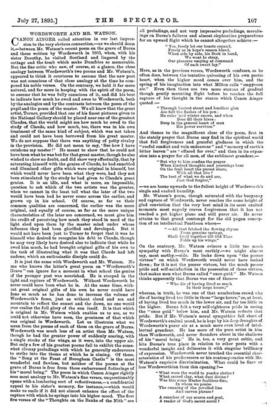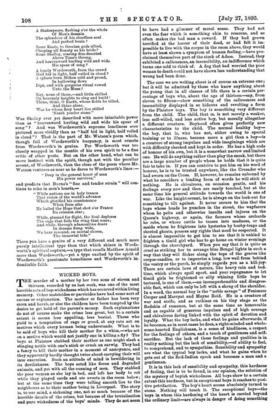WORDSWORTH AND MR. WATSON.
CANON AINGER called attention in our last impres- sion to the very obvious connection,—as we should deem it,—between Mr. Watson's recent poem on the grave of Burns and those written by Wordsworth in 1803, when, with his sister Dorothy, he visited Scotland and lingered by the cottage and the tomb which make Dumfries so memorable. But the fine critic who saw, of course, at a glance, the close analogy between Wordsworth's two poems and Mr. Watson's, appeared to think it courteous to assume that the new poet was not conscious of that close analogy at the time he com- posed his noble verses. On the contrary, we hold it far more natural, and far more in keeping with the spirit of the poem, to assume that he was fully conscious of it, and did his best to indicate how much he owed and owes to Wordsworth, both by the analogies and by the contrasts between the poem of the pupil and the poem of the master. We all know that the great artist, Turner, provided that one of his finest pictures given to the National Gallery should be placed near one of the greatest Clandes, that the world might see how much he owed to the study of Claude, and how much, too, there was in his own treatment of the same kind of subject, which was not taken and could not have been borrowed from his great master. We do not suppose that there was anything of petty rivalry in the provision. He did not mean to say, See how I have outshone my master !' He meant to show that he could not have been what he was but for that great master, though he also wished to show no doubt, and did show very effectually, that by saturating himself with the genius of Claude, he had ennobled and illumined other gifts which were original in himself, but which would never have been what they were, had they not been stimulated by the study he had given to Claude's great genius. It is an idle, and what is more, an impossible, question to ask which of the two artists was the greater, when we cannot in the least tell what the later of the two would have been had he never come across the earlier, and grown up in his school. Of course, so far as their common qualities are concerned, the earlier was the more original, and equally of course, so far as the more unique characteristics of the later are concerned, we must give him the credit of perceiving how much they stood in need of the light shed upon them by the master mind under whose influence they had been glorified and developed. But it would not have been just to Turner to forget that it was he himself who desired to recognise his debt to Claude, though he may very likely have desired also to indicate that while he owed him much, he had brought original gifts of his own to the task of illustrating what it was that Claude had left undone, which an enthusiastic disciple could do.
It is just the same with Wordsworth and Mr. Watson. No one who knows the latter's great poem on " Wordsworth's Grave " can ignore for a moment in what school the genius A the younger poet was nourished. He is steeped in the light and rapture of Wordsworth. Without Wordsworth he never could have been what he is. At the same time, with- out great original gifts of his own he never could have lone so much as he has done to increase the volume of Wordsworth's fame, just as without cloud and sea and mountain to reflect the sunset and the dawn, no one would Byer realise the full glory of the sun itself. It is that which is original in Mr. Watson which enables us to see, as we 3ould not otherwise have seen, the greatness of that which was original in Wordsworth. Let us illustrate what we mean from the poems of each of them on the grave of Burns. Wordsworth was much less of an artist than Mr. Watson, though he had the greater power of suddenly soaring, with a single stroke of the wings, as it were, into the upper air. But only a few of his greatest poems fail to exhibit the some- what clumsy preludings with which he generally endeavours to strike into the theme at which he is aiming. Of these, the " Song at the Feast of Brougham Castle " is the most wonderful and flawless, but neither of the poems at the grave of Burns is free from these embarrassed flutterings of his "moral being." The poem in which Canon Ainger rightly sees most analogy to Mr. Watson's fine verses, unquestionably opens with a lumbering sort of reflectiveness,—a confidential appeal to his sister's memory, for instance,—which would make us smile if it did not almost enhance the effect of the rapture with which he springs into his higher mood. The first five verses of the " Thoughts on the Banks of the Nith " are
all preludings, and not very impressive preludings, moralis- ings on Burns's failures and almost elephantine preparations for an upward flight which he cannot altogether achieve :—
" Yes, freely let our hearts expand, Freely as in hope's season bland, When side by side, his Book in hand, We wont to stray, Our pleasure varying at command Of each sweet lay."
Here, as in the previous verses, Wordsworth confuses, as he often does, between the tentative quivering of his own poetic heart, when the higher mood comes over him, and the spring of his imagination into what Milton calls "empyrean air." Even then there are two more stanzas of gradual though gently mounting flight before he reaches the full rapture of his thought in the stanza which Canon Ainger quoted :—
" Through busiest street and loneliest glen
Are felt the flashes of his pen : He rules 'mid winter snows, and when Bees fill their hives : Deep in the general heart of men His power survives."
And thence to the magnificent close of the poem, first in the stately prayer that Burns may find in the spiritual world that full forgiveness and grateful gladness in which the "rueful conflict and vain endeavour" and "memory of earth's bitter leaven " are effaced for ever," and then in its expan- sion into a prayer for all men, of the sublimest grandeur,—
" But why to him confine the prayer
When kindred thoughts and yearnings bear On the frail heart the purest share, With all that live ?
The best of what we do and are, Just God forgive,"
—we are borne upwards to the fullest height of Wordsworth's single and exalted humility.
Mr. Watson's poem, though saturated with the buoyancy and rapture of Wordworth, never reaches the same height of glad conviction that the very best mind in its most exalted moments most eagerly craves forgiveness that it has not reached a yet higher plane and still purer air. He never attains to that grand contempt for the old pagan concep- tion of an intellectual Pantheon where-
" —All that fetched the flowing rhyme From genuine springs,
Shall dwell together till Old Time Folds up his wings."
On the contrary, Mr. Watson evinces a little too much sympathy with Burns's most earthly,—we might almost say, most earthy,—side. He looks down upon "the poorer virtues" on which Wordsworth would never have looked down ; for it is not the poorer virtues, but the much poorer pride and self-satisfaction in the possession of those virtues, that makes men what Burns called " unco gnid." Mr. Watson thinks apparently that Burns was one of those-
" Who die of having lived so much In their large hours;" whereas, in truth, he was one of that numberless crowd who die of having lived too little in those "large hours," or, at least, of having lived too much in the lower air, and far too little in the higher. Barns felt a very self-righteous pride in seeing the " unto guid " below him, and Mr. Watson reflects that
pride. But if Mr. Watson's moral sympathies fall short of Wordsworth's exalted mood, he is kept by his deep draughts of Wordsworth's purer air at a much more even level of intel- lectual grandeur. He has more of the pure artist in him than Wordsworth, and never flounders about in the shallows of his " moral being." He is, too, a very great critic, and hits Burns's true place in relation to other poets with a wonderful insight and delineates it with singular brilliancy
of expression. Wordsworth never touched the essential char- acteristics of his predecessors or his contemporaries with Mr. Watson's exquisite discrimination. What could be finer or
less Wordsworthian than this opening ?—
" What woos the world to yonder shrine? What sacred clay, what dust divine ? Was this some Master faultless-fine, In whom we praise
The canning of the jewelled line And carven phrase?
A searcher of our source and goal, A reader of God's secret scroll ?
A Shakespeare, flashing o'er the whole Of Man's domain The splendour of his cloudless soul And perfect brain ?
Some Keats, to Grecian gods allied, Clasping all Beauty as his bride? Some Shelley, soaring dim-descried
t. Above Time's throng,
And heavenward hurling wild and wide His spear of song ?
A lonely Wordsworth, from the crowd Half hid in light, half veiled in cloud ? A sphere born Milton cold and proud, In hallowing dews
Dipt, and with gorgeous ritual vowed Unto the Muse ?
Nay, none of these,—and little skilled On heavenly heights to sing and build ! Thine, thine, 0 Earth, whose fields he tilled, And thine alone, Was he whose fiery heart lies stilled 'Neath yonder stone."
Was Shelley ever yet described with more inimitable power than as " heavenward hurling wild and wide his spear of song " ? And was Wordsworth's supreme loneliness ever pictured more vividly than as "half hid in light, half veiled in cloud" ? That is the part of Mr. Watson's poem which, though fall of Wordsworth's buoyancy, is most remote from Wordsworth's in genius. For Wordsworth was too closely wrapped in the mantle of his own spirit to be a fine critic of other poets. But on the other hand, what can be more instinct with the spirit, though not with the peculiar accent, of Wordsworth, than the close of the poem where Mr. Watson ventures as near as he dares to Wordsworth's lines :- " Deep in the general heart of man His power survives," and predicts that Burns's "fine and tender strain" will con- tinue to echo in men's hearts,— " While nations see in holy trance That vision of the world's advance Which glorified his countenance
When from afar He hailed the Hope that shot o'er France Its crimson star; While, plumed for flight, the Soul deplores The cage that foils the wing that soars; And while, through adamantine doors In dreams flung wide, We hear resound, on mortal shores, The immortal tide."
There you have a genius of a very different and much more purely intellectual type than that which shines in Words- worth's spiritual rapture,—a type that recalls Matthew Arnold more than Wordsworth,—yet a type exalted by the spirit of Wordsworth's passionate homeliness and Wordsworth's in- domitable faith.



































 Previous page
Previous page